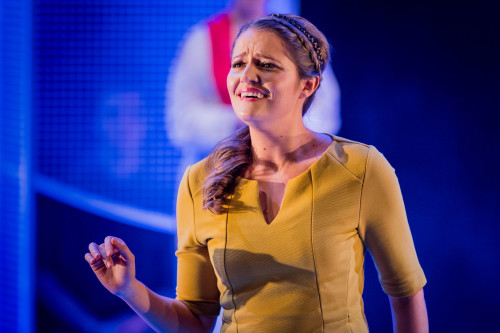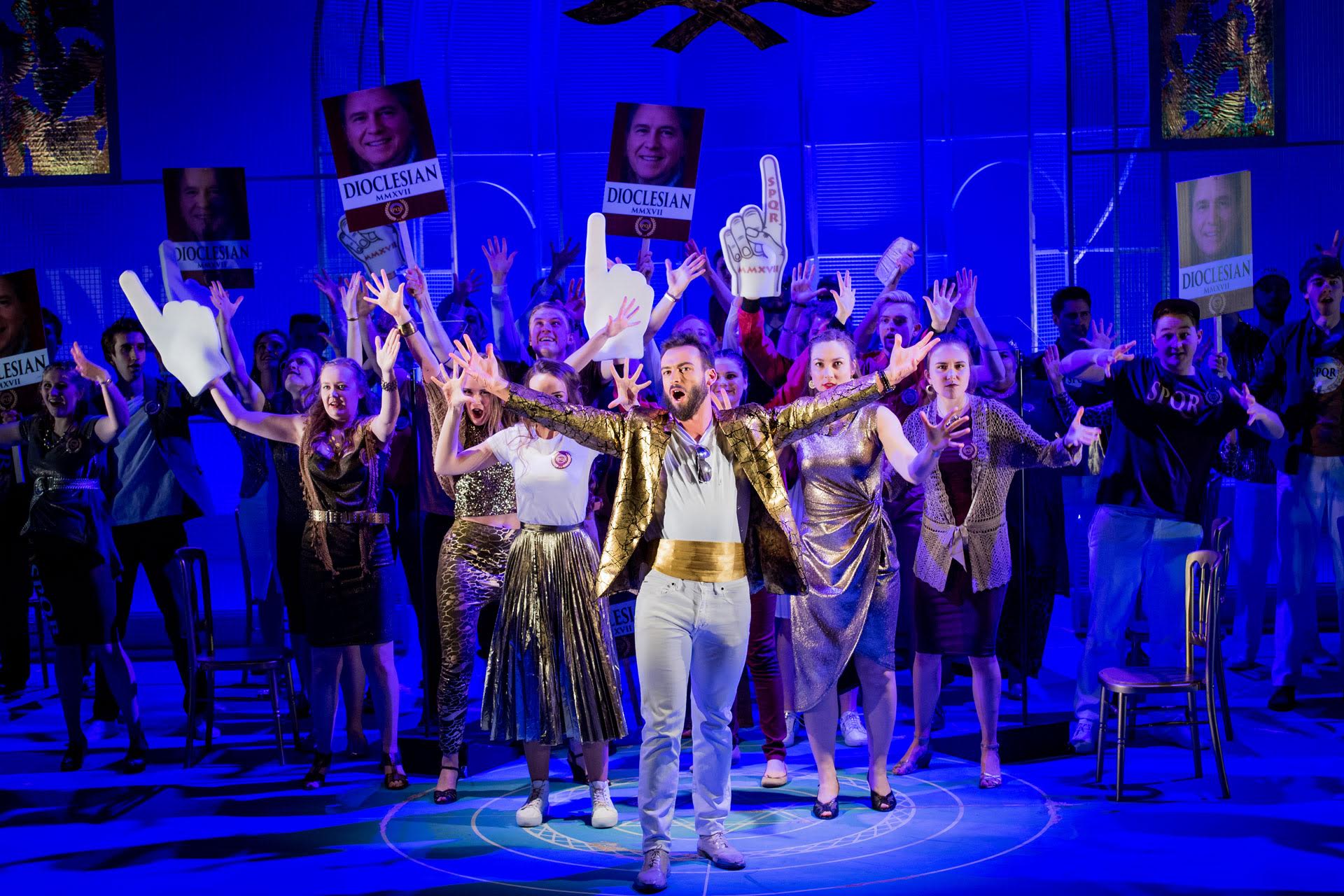 United Kingdom Handel, Theodora: Soloists, RNCM Opera Orchestra and Chorus / Roger Hamilton (conductor), RNCM Theatre, Royal Northern College of Music, Manchester, 30.3.2017. (MC)
United Kingdom Handel, Theodora: Soloists, RNCM Opera Orchestra and Chorus / Roger Hamilton (conductor), RNCM Theatre, Royal Northern College of Music, Manchester, 30.3.2017. (MC)

Handel, Theodora
Cast:
Theodora – Samantha Clarke
Didymus – Chelsea Burns
Septimius – Louis-Charles Gagon
Irene – Rebecca Barry
Valens – Edward Robinson
Messenger – Gabriel Seawright
Production:
Director – John Ramster
Set and Costume Designer – Bridget Kimak
Lighting Designer – Jake Wiltshire
Chorus Master – Kevin Thraves
The students at Manchester’s Royal Northern College of Music are certainly given a wide range of productions. In recent seasons I have seen Così fan tutte a timeless Mozart masterpiece, Weill’s undervalued Street Scene more of a musical than an opera, La Vie Parisienne one of Offenbach’s many moderate operettas he knocked out for Parisian audiences and Sondheim’s compelling musical Company set in a 1960s Manhattan apartment. Tonight the students performed Handel’s Theodora with the second of two different casts (review here), a system allowing broad opportunity of stage experience for the college students.
Handel composed over forty operas so it is not always easy to understand the trend of fully staging his oratorios, of which he wrote almost thirty, as operas. Notably I remember director Peter Sellers producing Theodora as an opera at Glyndebourne in 1996. For Theodora a mature dramatic work Handel used a Thomas Morell setting in English that concerns the Christian martyr Theodora and her lover the Roman Officer Didymium, a convert to Christianity. This all takes place in Antioch (now Turkey) under the rule of Emperor Diocletian around 300AD.
By choosing an oratorio that is only rarely performed fully staged the creative team had given themselves an interesting project. Director John Ramster and set and costume designer Bridget Kimak decided on a contemporary staging set in times of religious intolerance and persecution with the horrors of the current war in the Middle East never far away. The centrepiece was a large dome-roofed conservatory with sliding side panels. In front of the conservatory was a floor design with three concentric circles surrounding a six-pointed geometric star figure. Kimak’s costumes were an eclectic mix between traditional loose middle-eastern clothing and present-day styles. At various points government agents wore dark suits and sun glasses, partying president Valens a jacket, sash and baseball cap all in gold with white jeans and stately princess Theodora a fitted mustard coloured dress then later a skimpy cheerleader outfit with knee pads and silver pompoms. As rather nervous military personnel, Didymus and Septimius were clad in scarlet boiler suits with black webbing sets and black high top boots while sober Christian leader Irene first wore a maroon cleaner’s tunic that she pulled off to reveal a white linen surplice, red clerical stole and black leggings. Attempting to bring an oratorio to life the concept behind the production worked reasonably well showing considerable directional imagination. On the downside were the kitschy crowd scenes which were just about bearable but it was the final couple of scenes that were the most problematic with the handgun blundering around from one person to another at a rate of knots and the resurrection into heaven ineffective and somewhat bewildering.
In a week in Munich where I had seen performances of Mozart’s Die Entführung aus dem Serail by the Bayerische Staatsoper and J.S. Bach’s St. John Passion with the Chor und Symphonieorchester des Bayerischen Rundfunks both performed to perfection it was interesting making a comparison with the Manchester college students. Where technique was concerned especially coloratura in truth only Samantha Clarke and to a slightly lesser degree Rebecca Barry were up to the challenges presented by Handel’s coloratura demands.
In the title role Samantha Clarke was exceptional. With her strong projection and abundant dramatic expression combined with assured acting she certainly appears ready for a professional part in opera or musical. From start to finish she performed Theodora beautifully all through her range gliding easily to her high top register. Both Chelsea Burns as Didymus and Louis-Charles Gagon as Septimius didn’t seem at all comfortable in this Baroque repertoire with uneven, nervy singing never fully recovering from their disappointing starts. A production from a later period will probably suit them better. Looking ice cool and assured in the part of Irene, Rebecca Barry coped well with the technical challenges. Warm, clear and resonant Barry’s voice was deeply expressive at times. Noticeably she seemed to employ more vibrato than the other singers when personally I prefer a straighter tone in Handel. As Valens, Edward Robinson also struggled with the demands of the repertoire but his confident personality ensured that he gave as much as he could to the role maintaining an upbeat approach. In the small role of the Messenger Gabriel Seawright coped very well and I look forward to seeing him perform something more substantial soon.
Making a tremendous impact the fresh sounding chorus was in quite marvellous form and chorus master Kevin Thraves deserves congratulation. Under Roger Hamilton’s direction from the harpsichord the orchestra responded well playing with commitment and no shortage of vitality. There were some minor intonation problems on the high strings in the final act but I put that down to tiredness in a work that can take twice as long as Mahler’s longest work his Third Symphony. Although sung in English I certainly didn’t hear all the words and surtitles would have been very helpful.
Overall the creativity of the production was satisfying and thanks to the endeavours of the principals and cast Theodora made an entertaining and enjoyable evening.
Michael Cookson
